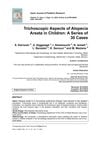April 2016 in “The journal of investigative dermatology/Journal of investigative dermatology” The ALADIN score can predict how well patients with alopecia areata will respond to JAK inhibitor treatments.
 124 citations,
October 2019 in “Frontiers in Immunology”
124 citations,
October 2019 in “Frontiers in Immunology” Janus kinase inhibitors are promising treatments for autoimmune skin diseases like eczema and psoriasis.
 January 2023 in “Asian Journal of Pediatric Research”
January 2023 in “Asian Journal of Pediatric Research” Trichoscopy is crucial for diagnosing and assessing alopecia areata in children.
[object Object]  42 citations,
April 2021 in “Journal of clinical pharmacology”
42 citations,
April 2021 in “Journal of clinical pharmacology” Baricitinib helps treat several diseases, including COVID-19, but has side effects and needs careful monitoring.
 223 citations,
September 2018 in “Rheumatology”
223 citations,
September 2018 in “Rheumatology” JAK inhibitors are effective in treating various immune-related diseases, not just rheumatoid arthritis.
 56 citations,
January 2021 in “Clinical and Experimental Medicine”
56 citations,
January 2021 in “Clinical and Experimental Medicine” The document concludes that while there are various treatments for Alopecia Areata, there is no cure, and individualized treatment plans are essential due to varying effectiveness.
 13 citations,
April 2019 in “Actas Dermo-Sifiliográficas”
13 citations,
April 2019 in “Actas Dermo-Sifiliográficas” Vitamin D is important for skin health, but more research is needed to understand its full effects and treatment potential.
 April 2021 in “Sohag Medical Journal”
April 2021 in “Sohag Medical Journal” Alopecia areata is an autoimmune condition causing hair loss, linked to genetic factors and immune system issues, with no cure yet.
 September 2024 in “Egyptian Journal of Dermatology and Venerology”
September 2024 in “Egyptian Journal of Dermatology and Venerology” Combining TRA and latanoprost is most effective for treating localized alopecia areata.
 46 citations,
June 2018 in “American Journal of Clinical Dermatology”
46 citations,
June 2018 in “American Journal of Clinical Dermatology” Hair loss is common in lupus patients and can be permanent or reversible, depending on the type, with various treatments available.
 3 citations,
March 2021 in “Clinical, Cosmetic and Investigational Dermatology”
3 citations,
March 2021 in “Clinical, Cosmetic and Investigational Dermatology” Early treatment of Lupus Erythematosus Alopecia can prevent permanent hair loss, and various medications are effective.
 April 2024 in “Research Square (Research Square)”
April 2024 in “Research Square (Research Square)” Selenium supplements can help improve symptoms and metabolic markers in lupus patients.
 February 2024 in “PloS one”
February 2024 in “PloS one” Tofacitinib and adalimumab are promising treatments for cicatricial alopecia with few side effects.
 January 2024 in “Pan African Medical Journal”
January 2024 in “Pan African Medical Journal” Non-scarring hair loss is common in lupus patients and can be diagnosed with specific hair and tissue tests.
 April 2012 in “Informa Healthcare eBooks”
April 2012 in “Informa Healthcare eBooks” Lichen planopilaris is a rare, chronic condition causing hair loss, mainly in middle-aged women, and early treatment is important to prevent permanent baldness.
 January 2017 in “Acta dermato-venereologica”
January 2017 in “Acta dermato-venereologica” The congress showed that psychological therapy can help skin condition patients, social media affects acne stigma, education improves atopic dermatitis, and patient satisfaction in dermatology is high, especially with good doctor engagement.
 January 2022 in “Medical research archives”
January 2022 in “Medical research archives” Taking vitamin D might improve life for MS patients and reduce skin side effects from alemtuzumab treatment.
 3 citations,
May 2019 in “International journal of research in dermatology”
3 citations,
May 2019 in “International journal of research in dermatology” Platelet rich plasma is an effective treatment for alopecia areata.
 8 citations,
May 2018 in “Primary Care: Clinics in Office Practice”
8 citations,
May 2018 in “Primary Care: Clinics in Office Practice” Doctors should use a detailed patient history and physical exam to diagnose joint pain, and consult a rheumatologist early for suspected autoimmune diseases.
[object Object]  1 citations,
September 2022 in “Nepal journal of dermatology, venereology & leprology”
1 citations,
September 2022 in “Nepal journal of dermatology, venereology & leprology” Apremilast shows promise for several skin conditions but needs more research.
 October 2023 in “Research Square (Research Square)”
October 2023 in “Research Square (Research Square)” Oxidative stress is linked to mild patchy alopecia areata.
 1 citations,
April 2019 in “Acta Medica Philippina”
1 citations,
April 2019 in “Acta Medica Philippina” Azathioprine may help treat severe alopecia areata, but more research is needed.
 78 citations,
October 2020 in “Experimental Dermatology”
78 citations,
October 2020 in “Experimental Dermatology” Hidradenitis suppurativa is caused by genetic factors, inflammation, bacteria, hormones, and lifestyle factors like obesity and smoking.
 489 citations,
November 2021 in “Signal Transduction and Targeted Therapy”
489 citations,
November 2021 in “Signal Transduction and Targeted Therapy” The JAK/STAT pathway is important in cell processes and disease, and JAK inhibitors are promising for treating related conditions.
 1 citations,
April 2018 in “The journal of investigative dermatology/Journal of investigative dermatology”
1 citations,
April 2018 in “The journal of investigative dermatology/Journal of investigative dermatology” Oral tofacitinib significantly improves lichen planopilaris symptoms without adverse effects.
1 citations,
December 2023 in “Molecules/Molecules online/Molecules annual” JAK inhibitors show promise for treating various skin diseases.
 59 citations,
March 2020 in “Journal of Biomedical Science”
59 citations,
March 2020 in “Journal of Biomedical Science” Understanding how hair follicle stem cells work can help find new ways to prevent hair loss and promote hair growth.
 95 citations,
November 2018 in “Australasian journal of dermatology”
95 citations,
November 2018 in “Australasian journal of dermatology” Alopecia areata treatment varies, with no optimal method established yet.
 6 citations,
May 2022 in “Medicina-lithuania”
6 citations,
May 2022 in “Medicina-lithuania” IMA may indicate oxidative stress in skin and hair disorders, but more research is needed.
 April 2021 in “Anatolian current medical journal :”
April 2021 in “Anatolian current medical journal :” A patient developed hair loss after hepatitis C treatment with sofosbuvir and ribavirin.



























